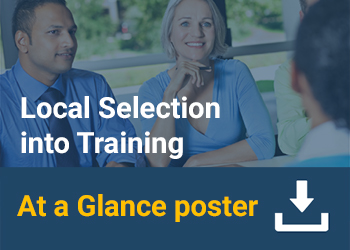Local selection
Local selection into training should be rigorous, fair and transparent.
 The RACP sets and monitors standards for selection, and provides advice on the selection and recruitment of trainee physicians.
The RACP sets and monitors standards for selection, and provides advice on the selection and recruitment of trainee physicians.
Health service employers play a role by determining the number of training positions available at their site.
To assist, we have developed resources to support Training Providers and Fellows with their local selection practices.
Trainee Selection and Recruitment Guide
 It begins with setting up a Selection Committee and planning the selection process.
It begins with setting up a Selection Committee and planning the selection process.
 Key tasks in designing a description that is reflective of the role.
Key tasks in designing a description that is reflective of the role.
 A transparent and informative application process is the goal.
A transparent and informative application process is the goal.
 The most important step of the recruitment process.
The most important step of the recruitment process.
 How to assess references, compile shortlists and candidate feedback.
How to assess references, compile shortlists and candidate feedback.
 Once you make your offer and finalise the recruitment process, what's next?
Once you make your offer and finalise the recruitment process, what's next?
 We want to assist local selection programs with supporting Indigenous trainees entering training.
We want to assist local selection programs with supporting Indigenous trainees entering training.
Responsibilities
How the recruitment or selection of trainee physicians into vocational training position occurs is the responsibility of the employing health service. They determine who and how many medical trainees are employed into training positions in Australia and Aotearoa New Zealand and how recruitment to vocational training positions is conducted.
| RACP
|
Training Setting or Network
|
- Defines the principles and standards for selection into training
- Determines the eligibility criteria and the selection criteria for its training programs
- Provides guidance and resources to training providers to assist them with their local selection process
- Accredits training providers
|
- Conducts local selection and recruitment of new trainees
- Ultimate decision-maker of which medical trainees receive a position within the setting
- Ensures compliance to appropriate governing legislation
- Complies with RACP selection policies, guidelines and Accreditation Standards
|
Unacceptable conduct
The Fair Work Ombudsman defines 'unlawful workplace discrimination' as occurring when an employer takes adverse action against a person who is an employee or prospective employee because of the following attributes of the person:
- race
- colour
- sex
- sexual orientation
- age
- physical or mental disability
- marital status
- family or carer’s responsibilities
- pregnancy
- religion
- political opinion
- national extraction
- social origin
Questions on any of these topics may be problematic unless you can show a direct link between the question and the person’s ability to perform the tasks required of them.
Asking inappropriate questions during interviews or pre-interviews or behaving in an unprofessional or inappropriate way through the selection or recruitment process isn'tt acceptable to the RACP. This conduct can be unlawful and also contravenes the standards of member conduct required under the RACP Code of Conduct.
Guidelines
Guidelines for Training Providers on Local Selection for Training have been developed outlining how principles of the RACP Selection into Training Policy and Training Provider Accreditation Standards can be applied in practice to the local selection of physician trainees for its Training Providers.
Trainee selection survey
In November 2019, we ran an anonymous pulse survey (PDF) on the trainee selection experience. We received over 500 trainee responses with the majority of experiences positive, which was excellent to hear.
However, some trainees shared experiences that concerned us and we're taking steps to eliminate these practices in the selection process.
As a part of our report we’ve made recommendations to help selection panels and we’ll be reinforcing communications around fair practices. We hope to run the selection pulse survey again to ensure practices are improving for trainees.